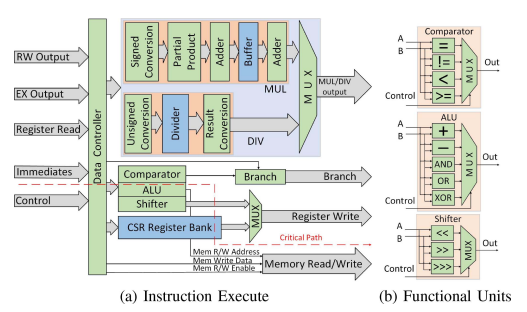A High-Performance Core Micro-Architecture Based on RISC-V ISA for Low Power Applications
Also Available Domains DSP Core|Xilinx Vivado|Xilinx ISE
Objective
The main objective of this paper is to enhance the operation speed with the help of instruction set architecture. The multiplier and dividers are employed to perform both signed and unsigned operations with less area cost
Abstract
In this project a high performance micro architecture based on RISC-V ISA has been proposed. Design of high-performance processors with very low power requirement is the primary goal of many contemporary and futuristic applications. In this brief, a novel processor micro-architecture is designed which is capable of achieving these requirements. This micro architecture is based on RISC-V Instruction Set Architecture (ISA). The proposed RISC V proposed here is a four stage pipeline architecture with very basic components to get the best possible result. This design consumes a dynamic power which is better than ARM Cortex-M3 and Cortex-M4 and also lower than many others designs. The results show that this core can outperform many existing commercial and open-source cores. The effectiveness of the proposed method is synthesized and simulated using Cadence EDA.
Keywords: - Micro-architecture, RV32IM, RISC-V, functional unit, Baugh Wooley, Booth, vedic, Dadda, FPGA, ARM.
NOTE: Without the concern of our team, please don't submit to the college. This Abstract varies based on student requirements.
Block Diagram

Specifications
Software Requirements:
- Cadence EDA
- HDL: Verilog
Hardware Requirements:
- Microsoft® Windows XP
- Intel® Pentium® 4 processor or Pentium 4 equivalent with SSE support
- 512 MB RAM
- 100 MB of available disk space
Learning Outcomes
- Basics of Digital Electronics
- VLSI design Flow
- Introduction to Verilog Coding
- Different modeling styles in Verilog
- Data Flow modeling
- Structural modeling
- Behavioral modeling
- Mixed level modeling
- Introduction to Arithmetic circuits
- Knowledge on multiplier and divider circuits
- Different control units and instructions
- Knowledge on RISC processor
- Applications in real time
- Cadence EDA for design and simulation
- Generation of Netlist
- Solution providing for real time problems
- Project Development Skills:
- Problem Analysis Skills
- Problem Solving Skills
- Logical Skills
- Designing Skills
- Testing Skills
- Debugging Skills
- Presentation Skills
- Thesis Writing Skills





 Paper Publishing
Paper Publishing
